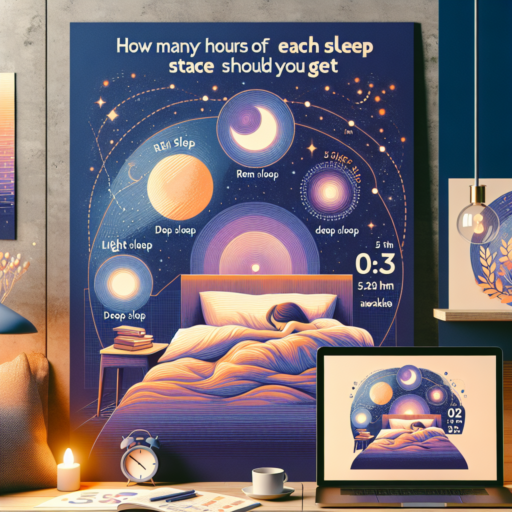How long should you spend in each sleep stage?
Understanding the duration one should spend in each sleep stage is crucial for enhancing overall sleep quality. Our bodies cycle through various stages of sleep, each serving a unique purpose in our health and well-being. These stages include the light sleep phases, deep sleep, and REM (Rapid Eye Movement) sleep.
During a typical night, an individual should aim to spend approximately 50-60% of their sleep time in the light sleep stages. These stages are essential for relaxation and preparation for the deeper sleep stages. Approximately 20-25% of sleep should then be spent in deep sleep, which is critical for physical recovery, memory consolidation, and hormonal regulation. The remaining 15-25% of sleep time should be allocated to REM sleep. This stage is vital for emotional regulation, memory, and learning processes.
It’s important to note that these percentages are averages and can vary based on individual needs and specific health conditions. Disruptions in these percentages may lead to feelings of tiredness and reduced cognitive function.
What is better, REM or deep sleep?
The debate between REM (Rapid Eye Movement) sleep and deep sleep has long intrigued both scientists and those seeking to optimize their rest for health and wellness. Identifying which one is «better» might not be straightforward as both play crucial roles in our sleep cycle. REM sleep, often associated with vivid dreams, is crucial for emotional regulation and memory consolidation. On the other hand, deep sleep, or slow-wave sleep, is pivotal for physical recovery and growth hormone release.
The Importance of REM Sleep
During REM sleep, the brain is almost as active as it is while you are awake. This phase is essential for processing and consolidating memories and for learning new information. REM sleep has also been linked to creativity and problem-solving abilities. It’s the time when the brain synthesizes all it has absorbed during the day and forms long-term memories. Without sufficient REM sleep, cognitive functions, including focus and memory, can be significantly impaired.
The Significance of Deep Sleep
Deep sleep is the most rejuvenating and restorative phase of the sleep cycle. It’s when the body repairs muscles and tissues, stimulates growth and development, boosts immune function, and builds up energy for the next day. Deep sleep’s role in physical health cannot be overstated; it is when the body essentially performs maintenance to ensure its systems are running smoothly. A lack of deep sleep can lead to a weakened immune system, less energy, and poorer overall health.
In summary, trying to determine which phase of sleep is «better» might miss the complexity of how REM and deep sleep complement each other. Both stages are integral to our well-being, serving different but equally vital functions in maintaining mental and physical health. Understanding the unique benefits of REM and deep cycle sleep encourages a more holistic approach to improving sleep quality.
No se han encontrado productos.
What are good percentages of sleep stages?
Understanding the optimal distribution of sleep stages is vital for maintaining good health and proper cognitive function. Typically, sleep is divided into two main categories: Rapid Eye Movement (REM) and Non-Rapid Eye Movement (NREM) sleep. NREM is further divided into stages 1, 2, and 3, each playing a unique role in our sleep cycle.
During a healthy night’s sleep, the distribution of these stages should ideally follow specific percentages. **NREM Stage 1** should take up about 5% of your sleep, acting mainly as the transition period into deeper sleep phases. **Stage 2**, the most prevalent throughout the night, should comprise approximately 45-55% of your sleep. This stage is crucial for cognitive recovery and memory consolidation. **Stage 3**, known for being the deepest phase of NREM sleep, should account for 20-25% of the night. It is during this stage that the body performs most of its physical repair and recovery. The final stage, **REM sleep**, should represent around 20-25% of your sleep. REM sleep is essential for emotional regulation and forming memories.
These percentages can vary based on age, lifestyle, and health conditions. For example, infants spend much more time in REM sleep, which is necessary for their brain development. As we age, the amount of time we spend in each sleep stage, especially deep sleep and REM, tends to decrease. Making adjustments to your lifestyle, such as limiting exposure to blue light before bedtime, can help to optimize the quality of sleep and ensure a healthy distribution of sleep stages.
How many hours of REM sleep do you need?
Understanding the amount of REM (Rapid Eye Movement) sleep you require is crucial for optimizing your sleep quality and overall health. REM sleep, one of the four stages of the sleep cycle, plays a critical role in memory consolidation, emotional regulation, and brain development. While individual sleep needs can vary, adults typically require about 20-25% of their total sleep time in the REM stage. This translates to approximately 90-120 minutes of REM sleep per night, considering an average of 7-9 hours of total sleep.
Factors Influencing REM Sleep Needs
Several factors can influence how much REM sleep you need. Age is a significant factor; for example, newborns spend about 50% of their sleep time in REM, while adults need much less. Lifestyle choices and stress levels can also impact the amount of REM sleep, with stress potentially reducing the duration of REM sleep. It’s essential to consider these factors when assessing your sleep patterns and making adjustments to improve sleep quality.
Maximizing Your REM Sleep
To ensure you’re getting enough REM sleep, focus on maintaining a consistent sleep schedule and creating a bedtime routine that promotes relaxation. Avoid stimulants like caffeine and heavy meals before bedtime, as they can disrupt your sleep cycle. Moreover, creating a conducive sleeping environment, free from distractions and noise, can help increase the duration and quality of REM sleep. Regular physical activity and managing stress levels through techniques like meditation or yoga can also promote healthier sleep patterns, including increased REM sleep.


